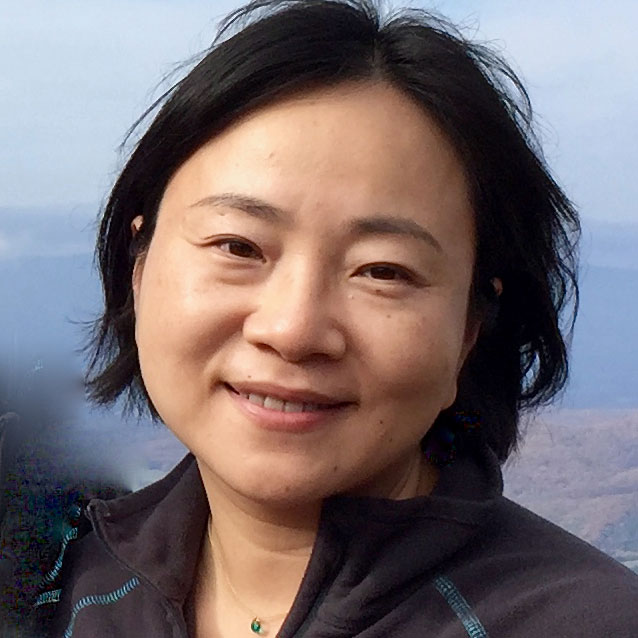Waverly Ding Directory Page

Waverly Ding
Associate Professor
PhD, University of Chicago
Waverly Ding is Associate Professor of Management & Organization at the University of Maryland's Robert H. Smith School of Business. Dr. Ding earned her MBA and Ph.D. in business from the University of Chicago. Prior to joining the Smith School faculty, she was an assistant professor at the Haas School of Business, at the University of California at Berkeley.
Dr. Ding’s research focuses on high-tech entrepreneurship and strategy, knowledge transfer between universities and industrial firms, and the U.S. biotech industry. She has also conducted research relating to labor force in science and technology. Her work has been published in Science, American Journal of Sociology, Management Science, Journal of Industrial Economics, and Research Policy.
Primary Research Areas
- Entrepreneurship
- Technology strategy
- Innovation
- Labor productivity in science and technology
Grants and Awards
- National Science Foundation, #2419996, “A Novel Measure of Organizational Engagement with ESG Based on 2008-2023 Job Postings Data in the U.S.” $349,237, 10/1/2024-9/30/2027.
- General Research Fund, Project#11611021, “Balancing authoritarian innovation and accountability: An empirical study on the dual-track of patent intellectual property right protection in China (1986-2020)”. 763,831 HKD, 01/01/2022 – 31/12/2024
- The Kauffman Foundation Knowledge Challenge Grant, $91,985, 2019-2021
- Kenan Institute Frontiers of Entrepreneurship Research Grant, University of North Carolina at Chapel Hill, $10,000, 2018-2019
- Batten Fellowship, Batten Institute, Darden School of Business, University of Virginia, $10,000, 2017-2018
- University of Maryland Research and Scholarship Award, Summer 2017, with Debra Shapiro, $9000
- NSF EAGER Grant #1550727 “Gender Differences in the Job Mobility and Earnings of U.S. Scientists and Engineers,” $50,000, 2015-2016.
- National Science Foundation of China Grant #71472010 “Venture Capital Industry in China”, 2014-2017, RMB 630,000
- Kauffman Foundation Junior Faculty Fellowship in Entrepreneurship Research, 2009-2011 (one of the five inaugural recipients selected among entrepreneurship researchers in the U.S.)
- UC Berkeley Haas School of Business Schwabacher Award, 2008-2009
- Kauffman Foundation Entrepreneurship Research Mini-Grant, 2007-2009
- UC Berkeley Regents’ Junior Faculty Fellowship, 2006
- Kauffman Foundation Emerging Scholars Initiative Dissertation Research Grant, 2002
- International Peace Scholarship, P.E.O. Foundation, 1998 & 2000
Professional Service
- National Science Foundation panelist
- Associate Editor (2015-current), Management Science
- Advisory Editor (2006-present), Research Policy
In-progress Papers
- Advisor-Advisee Research Overlap and Its Implications for Scientists’ Early-Career Funding Performance — with Christopher Liu, Andy Back, Beril Yalcinkaya. 3rd Round Revise and Resubmit at Organization Science.
- Abortion Restriction Laws and Mobility of Scientists — with Beril Yalcinkaya. Revise and Resubmit at Strategic Management Journal.
- Strategies for Capability Building in Young Technology Firms — with Beril Yalcinkaya, Anil K. Gupta. Revise and Resubmit at Strategic Management Journal.
- Impact of Generalized and Particularized Trust on Inducing and Sustaining Different Types of Inter-Organizational Networks — with Anil K. Gupta. Working paper.
- Going Public, Going Inclusive: Diversity Messaging in Job Postings — with Beril Yalcinkaya, Anil K. Gupta. Working paper.
- Does Work from Home Help Improve Women’s Pay? Disentangling the Selection from the Treatment Effect — with Hyeun J. Lee, Jia He, Fenmian Wang. Working paper.
- Not All Brokerage Yields Benefits: Brokerage Subtypes and Performance in Scientific Networks — with Christopher Liu, Young-kyu Kim, Beril Yalcinkaya. Awarded OMT Best Social Networks and Organizations Paper Award, Academy of Management 2025.
Published and Forthcoming Papers
- Xia, Jun, Fiona Yao, Fenmian Wang, Chunlin Liu, Hong Zhang, Jianan Li, Waverly W. Ding. 2025. “Bridging the Divide: How Dual-Background Leaders Unlock Returnee Innovation in Politically Connected Chinese Firms.” Forthcoming at Journal of Management Studies.
- Waverly W. Ding, Christopher C. Liu, Marta Villamor Martin. 2025. “Origins of Ideas and Entrepreneurs: Academic Entrepreneurs and Inventors,” in De Gruyter Handbook of Sociology of Innovation and Entrepreneurship, eds. Olav Sorenson and Patricia H. Thornton. Forthcoming. Link to Chapter
- Liu, Christopher, Andy Back, Beril Yalcinkaya, Waverly W. Ding. 2024. “Gender Diversity’s Different Impact on Junior versus Senior Biomedical Scientists’ NIH Research Awards.” Nature Biotechnology 42: 815–819. https://doi.org/10.1038/s41587-024-02234-y
- Sun, Xiaoyan, Xuanli Xie, Waverly W. Ding. 2024. “The Internet and the Gender Gap in Entrepreneurship.” Journal of Business Venturing 39(5). https://doi.org/10.1016/j.jbusvent.2024.106417
- Lin, Fen, Waverly W. Ding, Shi Chen. 2024. “The Patent Gold Rush? An Empirical Study of Patent Bubbles in Chinese Universities (1990–2019).” Journal of Technology Transfer. https://doi.org/10.1007/s10961-024-10071-z Link to SSRN
- Ding, Waverly W., Hyeun J. Lee, Debra L. Shapiro. 2023. “Are Entrepreneurs Penalized during Job Searches? It Depends on Who is Hiring?” Strategic Entrepreneurship Journal 17(4): 713–740. https://doi.org/10.1002/sej.1479
- Ding, Waverly W., Atsushi Ohyama, Rajshree Agarwal. 2021. “Where is the Promised Land? Trends in Gender Pay Gaps of Scientists and Engineers in Academia and Industry.” Nature Biotechnology 39(8): 1019–1024. (Links to STATA codes: data prep codes, regression codes)
- Cui, Victor; Waverly W. Ding; Yoshio Yanadori. 2019. “Exploration versus exploitation in technology firms: The role of compensation structure for R&D workforce.” Research Policy 28(6): 1534–1549.
- “Examining the Female Entrepreneur Advantage in Assembling Diverse Founding Teams” with Steven Gray and Weiyi Ng. Academy of Management Proceedings, Vol. 2019.
- Ding, Waverly W., Fiona Murray, Toby E. Stuart. 2013. “From Bench to Board: Gender Differences in University Scientists’ Participation in Corporate Scientific Advisory Boards.” Academy of Management Journal 56(5): 1443–1464.
- Ding, Waverly W. 2011. “The Impact of Founders’ Professional Education Background on the Adoption of Open Science by For-Profit Biotechnology Firms.” Management Science 57(2): 257–273.
- Ding, Waverly W., Emily Choi. 2011. “Divergent Paths to Commercial Science: A Comparison of Scientists’ Founding and Advising Activities.” Research Policy 40: 69–80.
- Ding, Waverly W., Sharon G. Levin, Paula E. Stephan, Anne E. Winkler. 2010. “The Impact of Information Technology on Scientists’ Productivity, Quality and Collaboration Patterns.” Management Science 56(9): 1439–1461.
- Azoulay, Pierre, Waverly W. Ding, Toby E. Stuart. 2009. “The Impact of Academic Patenting on the Rate, Quality and Direction of (Public) Research Output.” Journal of Industrial Economics 57(4): 637–676.
- Elfenbein, Hillary Anger, Noah Eisenkraft, Waverly W. Ding. 2009. “Do we know who values us? Dyadic meta-accuracy in the perception of professional relationships.” Psychological Science 20: 1081–1083.
- Azoulay, Pierre, Waverly W. Ding, Toby E. Stuart. 2007. “The Determinants of Faculty Patenting Behavior: Demographics or Opportunities?” Journal of Economic Behavior and Organization 63: 599–623. Reprinted in Recent Developments in the Economics of Science and Innovation, eds. A.N. Link, C. Antonelli, 2013.
- Stuart, Toby E., Salih Z. Ozdemir, Waverly W. Ding. 2007. “Vertical Alliance Network: the Case of University-Biotechnology-Pharmaceutical Alliance Chains.” Research Policy 36: 477–498.
- Ding, Waverly W., Fiona Murray, Toby E. Stuart. 2006. “Gender Differences in Patenting in the Academic Life Sciences.” Science 313(5787): 665–667.
- Stuart, Toby E., Waverly W. Ding. 2006. “When Do Scientists Become Entrepreneurs? — The Social Structural Antecedents of Commercial Activity in the Academic Life Sciences.” American Journal of Sociology 112(1): 97–144. Reprinted in Management of Innovation and Entrepreneurship (2009), 4: 1–35.
Videos
News
Three Professors Receive Awards; 26 Scholars Present Research
SMITH BRAIN TRUST – The BBC's "Doctor Who" series has long embraced the idea of change. It's been written into the script for years,…
SMITH BRAIN TRUST — Corporate gender gaps have narrowed in recent years, but men continue to dominate high-level positions. Among…
Research



Insights



Academic Publications
“Gender Diversity’s Different Impact on Junior versus Senior Biomedical Scientists’ NIH Research Awards,” published in Nature Biotechnology
We analyzed funding patterns of 2.3 million NIH grants distributed among biomedical scientists in the U.S. universities from 1985 to 2017 to present new evidence that as the biomedical research communities become more gender-diversified, women scientists as a whole gain more grant resources. However, these additional resources are distributed unevenly. We find that more resources flow to senior than to junior women scientists. By unearthing within-group inequality in science funding and careers, we highlight a new mechanism explaining the disadvantages faced by younger generations of women scientists. Importantly, this mechanism may have been obscured against the backdrop of advances in overall funding for women biomedical scientists.
Waverly Ding (Robert H. Smith School of Business, University of Maryland); Christopher C. Liu (Lundquist College of Business, University of Oregon), Beril Yalcinkaya (PhD candidate, Robert H. Smith School of Business, University of Maryland), Andy S. Back (The University of Hong Kong)
Advisor-Advisee Research Overlap and Its Implications for Scientists’ Early-Career Performance in the U.S.
Organization Science
A genealogical training process, in which senior (advisor) scientists engage in cross-generational transfer of skills and knowledge to junior (advisee) scientists is one of the core organizational features of modern science. In this paper, we examine the consequences of the tension faced by all junior scientists: to build upon an advisor’s skills or to strike out on one’s own? We study the implications of advisor-advisee research overlap for emerging scientists’ performance by constructing a novel, bibliometric-record-based dataset on 15,271 U.S. biomedical scientists (advisees) who were trained in 7,924 PI advisors’ labs between 1972 and 2009. We assessed the junior scientists’ performance in the first ten years of their careers as independent PIs. Tests across multiple research-overlap measures and model specifications reveal a consistently positive relationship between maintaining a higher degree of proximity to advisor’s research areas and the junior scientist’s early-career funding and publication performance. However, evidence is weak regarding scientific impact and non-existent regarding research disruptiveness. We further test how advisor status moderates the research overlap-performance relationship using both a large-sample analysis comparing the performance of academic siblings, and a more stringent difference-in-difference analysis leveraging the exogenous timing of the status elevation events experienced by the advisor scientists when they receive major scientific awards. Both tests yield consistent evidence that the positive relationship between advisor-advisee research overlap and advisee’s early-career performance is reduced as the advisor’s status increases. Taken together, these findings provide a more complete understanding of how advisor-advisee relationships shape new scientists’ performance during early careers.
Waverly W. Ding
Associate Professor of Strategy and Entrepreneurship
R.H. Smith School of Business
University of Maryland
Christopher C. Liu*
Associate Professor
Lundquist College of Business
University of Oregon
Andy (Seungho) Back*
University of Hong Kong
Beril Yalcinkaya
Wharton School
University of Pennsylvania